Terreno Común
Latin America & Europe: an artistic dialog
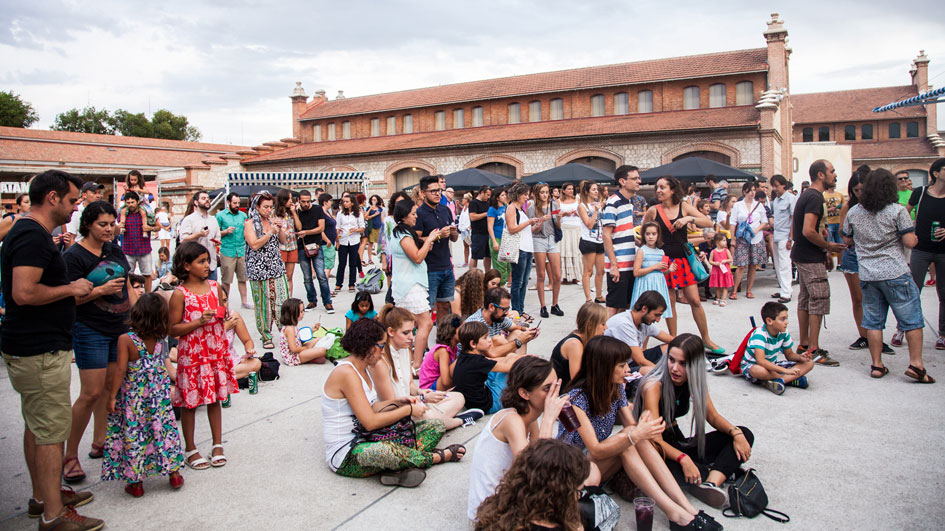
Terreno Común | Common Ground provides artists from Latin American and Europe with a shared workspace where contrasting perspectives and approaches can converge, and new ideas can emerge. Given the many ways cultures can intertwine, the project focuses on finding “Common Ground”.
ProjectArtistic research in cross-border exchange between cultures
If the unique thing about art is that it allows us to discover what we do not know and do not understand, this requires – especially in the exchange between cultures – opportunities for interaction. For the arts offer a field of experimentation where different patterns of perception, discourses and social structures meet and new knowledge can be developed. On the initiative of the Siemens Stiftung, a professional workspace for artistic research and development on both continents was therefore created in 2017 in collaboration with Naves Matadero – Centro Internacional de Artes Vivas Madrid and other partners. It includes artists, residencies, urban interventions and interactions with local artists. These encounters result in a series of collaborative projects, each developed jointly by artists from Latin America and Europe.
Collaborations between Latin American and Spanish artists
Since the founding of the first professional workspace in Madrid in July 2017, artists from Argentina, Chile, Cuba, Colombia, Peru and Uruguay, among others, have been working together with Spanish artists on further collaborative projects.
Current collaborations
Experimenta/Madrid opens a laboratory of collective thinking and creation at La Casa Encendida and in Madrid’s San Cristóbal neighborhood. At its core lies the question of the “magnetic fields” of artistic processes – forces that emerge when artists encounter worlds unfamiliar to them, worlds that unsettle or estrange, that belong neither to them nor to their artistic community.
Coordinated by Colombian artist and researcher Rolf Abderhalden Cortés and philosopher Adriana Urrea Restrepo, the project invites young artists under 30 from all disciplines. It explores what forms of appropriation, openness, and risk arise from such encounters, what working methods take shape, and what kinds of relationships develop within these new communities. It also asks: what impact does the presence of other forces – those that surface in a magnetic field – have on artistic creation itself, as well as on its modes of production and reception? Building on this notion of the magnetic field, the project fosters collective experiments in exchange with extra-artistic life-worlds, both human and non-human. Alongside reflections on participants’ creative processes, the program fosters encounters with international artists invited to the IDEM Festival, within which the laboratory takes place.
The project culminates on September 20, 2025, with a collective artistic intervention by the participating artists in the San Cristóbal neighborhood. Experimenta/Madrid is an offshoot of the platform Experimenta/sur, developed in Bogotá in 2012 by Mapa Teatro and Siemens Stiftung.
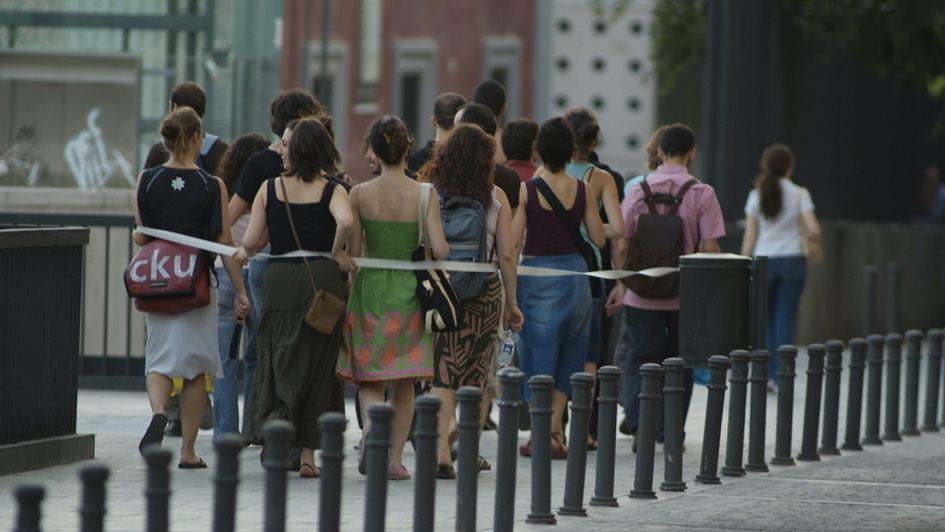
Overview of previous works
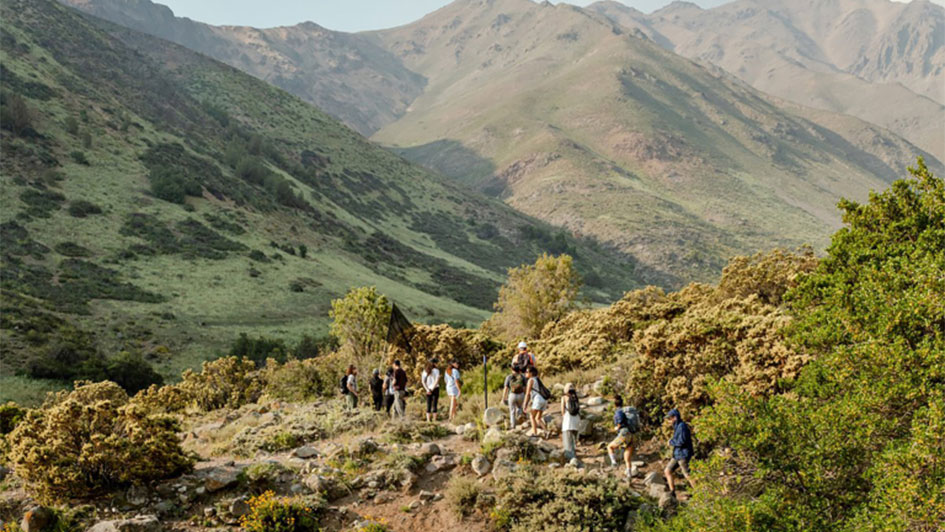
A recent project by Terreno Común looks at the interaction between art, indigenous knowledge, activism and research related to the current climate crisis.
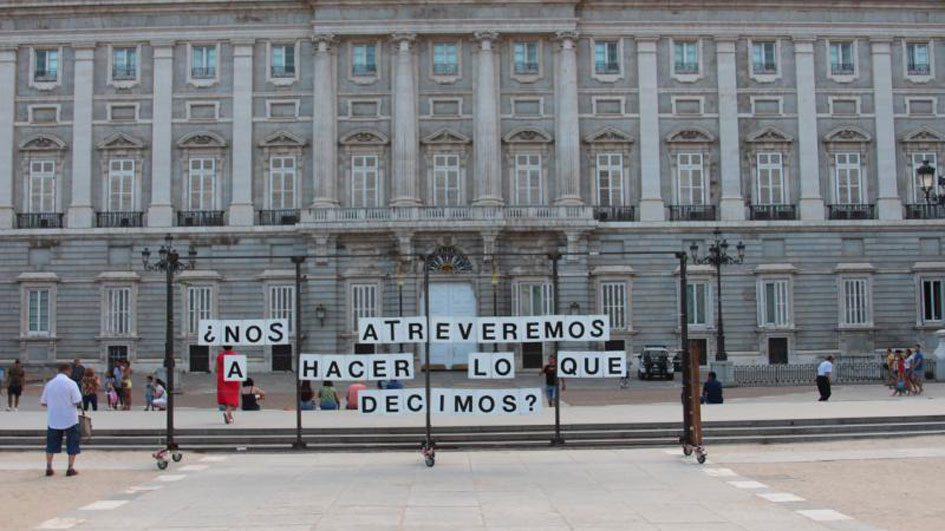
"Will we dare to do what we say?" A question posed to residents in front of the Palacio Real in Madrid.
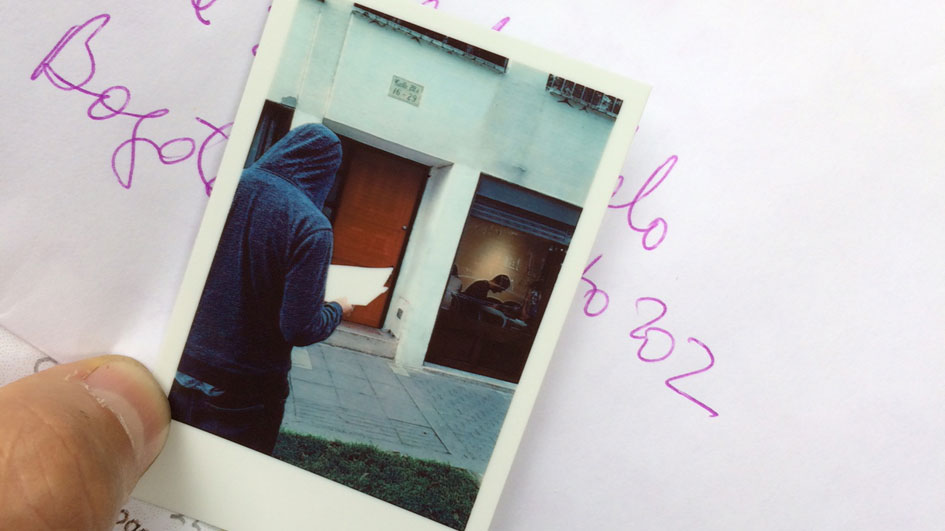
For the project "Correspondencia," the Colectivo Traficantes wrote letters to unknown addressees.
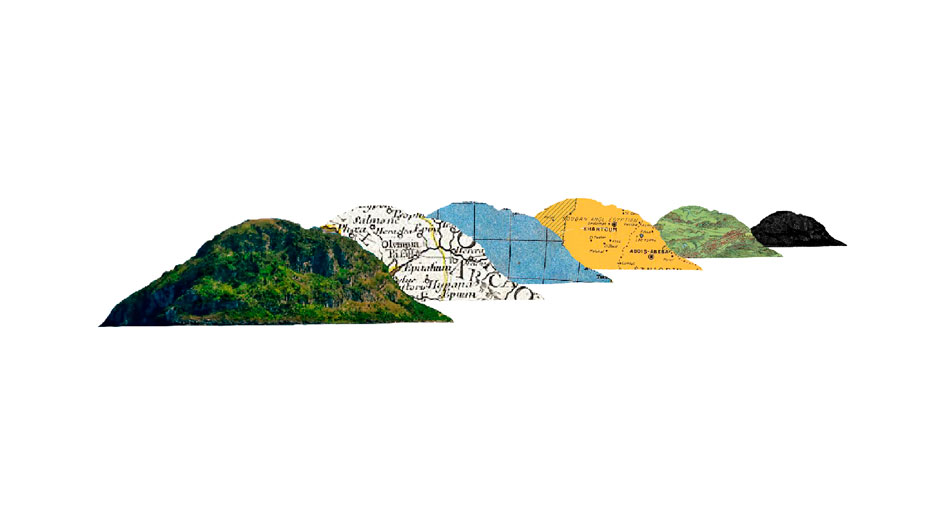
How can the descriptions of an "other" be overcome, Julián Mayorga and Andrés Gualdrón asked themselves:
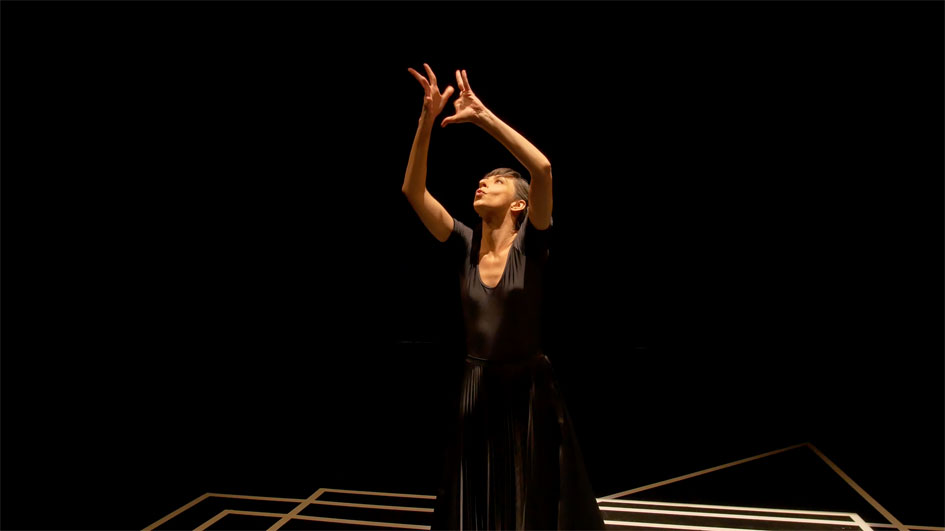
In "Trasunto #2" the Chilean artist María Siebald translates human rights into sign language.
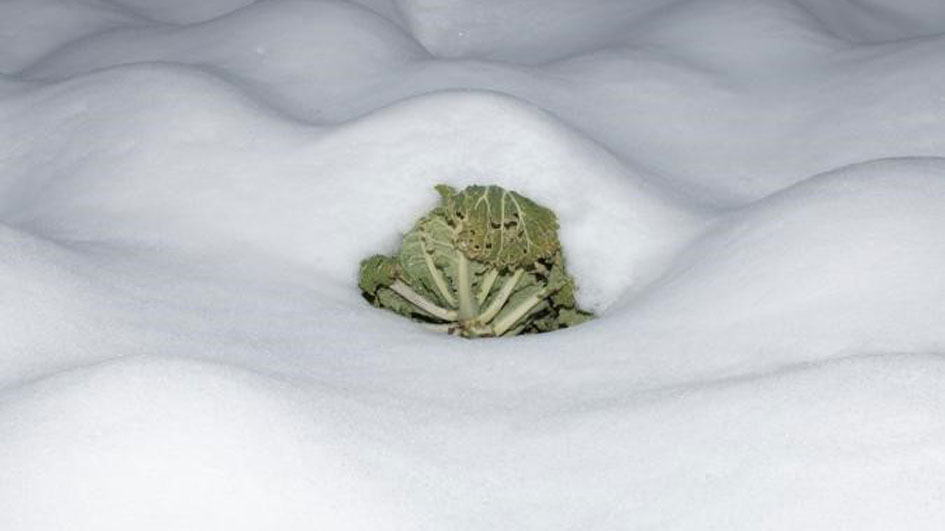
"Atlántida" is a landscape of resistance, but also a struggle for humanity, its strength, and fragility.
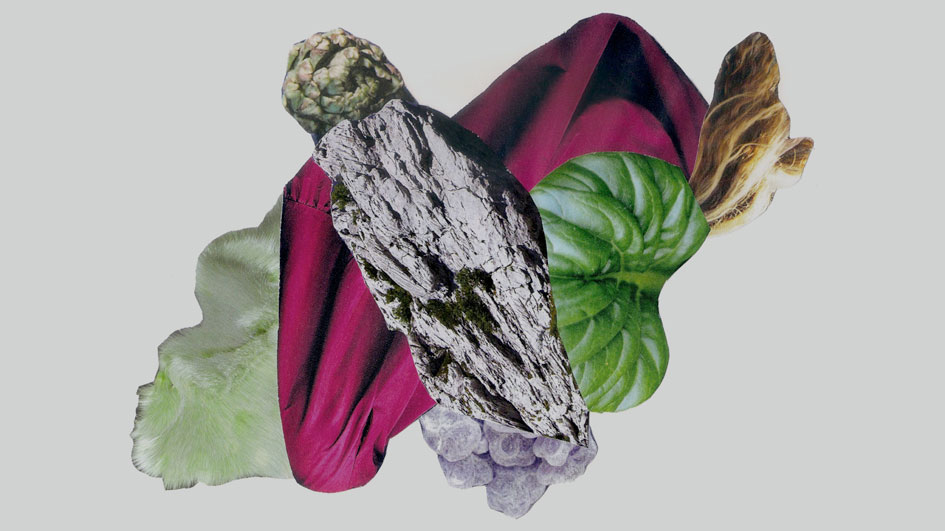
"The Stain" puts things together that don't seem to match.
Escuela del Sur unfolded between 2023 and 2024 as an experimental learning space for artistic creation in Cádiz, shaped through dialogue with Latin American artists. Conceived by Rosa Romero and Alberto Cortés, the project sought not only to transform the local context but also to be transformed by it. Over the course of a year, two groups worked in parallel: “Grupo Petróleo”, where young people from the region came together, and “Grupo Salvaora”, a circle of local artists dedicated to exploring new artistic formats. Each group developed its practice within distinct modules, yet their paths crossed time and again, sparking mutual inspiration. Launched during the Festival Iberoamericano de Teatro de Cádiz 2023, the project wove together artistic creation, reflection, and collective learning into a continuous space that nurtured a vibrant creative community for more than a year. Public actions and presentations became catalysts for dialogue and critical engagement in a region where opportunities for experimental performing arts remain rare.
Vienna-based choreographer Amanda Piña has been working with her collective nadaproductions in various locations in Santiago de Chile on a series of projects entitled “La Escuela de las Montañas y del Agua” (School of Mountains and Water). With participants from Mexico, Chile and Europe, she was researching the history of drinking water in Santiago de Chile and the course of the Mapocho and Maipo rivers, whose sources lie in the nearby Andes. The project was embedded in a long-term study of the current loss of cultural and biological diversity on our planet. The potential interaction between art, indigenous knowledge, activism and scientific research in the context of the current climate crisis was the focus of the project.
The program started with an exhibition on the grounds of the Museo Interactivo Mirador in Santiago de Chile on December 2, 2022, and subsequently included a series of talks, performative parcours into the surrounding mountains and to water points in the city, workshops, and finally a stage production entitled “Danzas Climaticas” (Climate Dances) with Chilean performers at GAM – Centro Cultural Gabriela Mistral in March 2022.
Mapa Teatro’s project “El Arcano de la Quina” focuses on the scientific controversy surrounding the discovery of the quinine and looks at its biopolitical context. “The clearest example of how scientific knowledge, colonial power and the discourse of purity of blood were closely linked in New Granada is the famous dispute between doctors José Celestino Mutis and Sebastián López Ruiz over the paternity of the discovery of quinine”, explains philosopher Santiago Castro. The project will initially explore archives in Madrid and Bogotá. The results of the research will be presented in Naves de Matadero in March 2020.
Since October 2019, the Spanish architect and artist Santiago Cirugeda and his collective Recetas Urbanas together with a team of Cuban institutions and experts in history, architecture and art have been working on a new project in the Terreno Común series that aims to revive community spirit in a legendary place: the birthplace of Cuban poet Dulce María Loynaz in Havana, Cuba, threatened by decay. The project involves the neighbourhood in the transformation of the vulnerable architectural and social space of high cultural value. The resulting collective work can be seen from 7 to 9 February 2020.
Chilean director and actor Maria Siebald explored the process of translation. In her initial research phase in June and July 2018, she worked in Madrid with deaf communities on sign language interpretations of contemporary Spanish poems. In the production phase that followed from January to April 2019, she came up with her production “Trasunto #2,” which was performed for the first time from 5-7 April 2019 in Naves. The film “30 ADH / Artículos de los derechos humano” was created at the same time. In 30 short pieces, the film translates each article of the 1948 Universal Declaration of Human Rights into sign language, transforming the document into choreography. The installation was on display in Madrid from 5-21 April 2019.
Spanish choreographer Maria Jerez created a room of shared knowledge with her production “The Stain,” where objects of differing natures coexist and draw our attention. The piece was performed from 29-31 March 2019 in Madrid. During the production process, she invited a carpenter, a musician, a painter, and a baker to bring objects that seemed out of place when put together.
“When we characterize others, to what extent are we characterizing ourselves?” Julián Mayorga, a musician living in Spain, and Andrés Gualdrón, a Colombian artist, asked themselves this question in their work at Centro Etopia de Zaragoza, Naves Matadero and later in Colombia. The narrative of their collaborative project “Islas Atlánticas” centers on the creation of a new archipelago in the Atlantic Ocean. In this parallel world between the continents, the artists explore questions of migration, settlement, and cultural interconnectedness. The result was a book, a CD of the production, and a concert, which premiered from 15-16 February 2019 at Matadero in Madrid.
In Madrid’s Matadero, Cuban author and theatermaker Laura Liz Gil Echenique worked together with the Spanish collective Los Bárbaros. The collaborative project is based on the story of Madrid’s Cerro Belmonte district from 1990. The residents, unhappy with the political situation, declared their district’s independence from Spain and applied for asylum in Cuba. In August 2018, the artists continued working on the piece in Cuba. The premiere was on 30 November 2018 at Naves de Matadero in Madrid.
How do we want to live with each other? From 11-22 July 2018, members of the interdisciplinary Chilean collective Mil M2 joined the Spanish artist Javier Cruz in exploring social life in eight districts in Madrid. Their intervention, “Proyecto Pregunta,” established a public space for reflection on current events and personal thoughts while creating opportunities for dialog. The project was implemented in cooperation with Veranos de la Villa.
“Colectivo Traficantes” was the first in a series of collaborative projects, running from 25 June to 24 July 2017. The group of artists (Mercedes Halfon/Argentina, Adriana Bermúdez Fernándes/Colombia, Diego Alejandro Garzón/Colombia, Laura Liz Gil Echenique/Cuba, Jorge Tadeo Baldeón/Peru, Leonor Courtoisie/Uruguay) first came together during Experimenta Sur 2016 in Bogotá. As a multi-disciplinary collective, the group created art using communication tools such as Skype, handwritten letters, or by mailing objects. Every day, countless objects move in some way around the globe – as traded goods, on computer screens, or among the personal belongings of migrants. By following the movement of these objects, there is a lot to learn about the adaptability of societies. As part of a research project, the collective examined the complex ties between personal and political realities and developed a series of actions called “Correspondencia,” a series of activities in which the group gave new meaning to trade and communication. The results were on display in a public project space featuring an exhibit, discussion, and performative elements from 18-21 July 2017 in the Matadero cultural center. After that, the project continued as a work-in-progress in Buenos Aires.
PartnersA Siemens Stiftung initiative in collaboration with
With support from
Project manager Terreno Común
Joachim Gerstmeier
joachim.gerstmeier@siemens-stiftung.org



